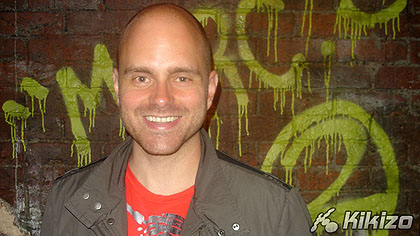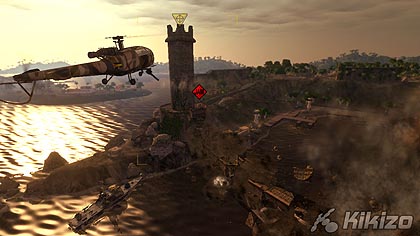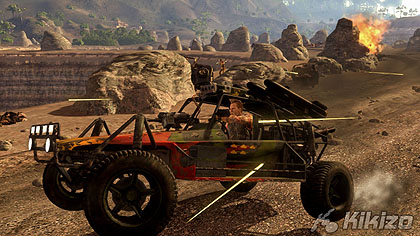Mercenaries 2: Huge Preview with Pandemic
Join us for a detailed look at open-world destruction-gasm Mercenaries 2: World in Flames, as we chat with Pandemic Studios' Jonathan Zamkoff and Cory Lewis.
Page 4
Kikizo: Before getting into development you worked in PR and marketing. How have your found that your experience there has helped you in your role as a producer?
Cory: Actually it's funny. It's hugely valuable. I started on the journalist side at IGN so I've always had that sort of creative aspiration, I guess, but having gone through the PR and marketing side of it, you really learn what are the other needs that balance a game. So as you create a path to production, you need to be thinking about, "We need to show this publicly at some point. At what point are we going to get to the point of creating a slice of the game that really shows well?", and managing that schedule versus purely going for development. You have to look at the big picture. It's a great product but we also want people to know about it and generate excitement and start to show it to retailers at a certain time. All those things affect your schedule. I highly recommend anyone who's interested in a creative path to experience other types of business experience, something that gives you that bigger perspective.
Kikizo: I don't want to talk too much about comparisons with Grand Theft Auto, but one of the things that really glued GTA IV together is the story and the acting. What would you say your approach has been this time around with these elements? Because I have to say to me it seems the weakest aspect at the moment and everything else is really strong.
Cory: There are certain aspects that are our priority, like the freedom in the world. One of the key things we want players to do is get in the world and then ask the question, "Can I do that, can I do that?" From a design perspective and a gameplay perspective we've always wanted to be able to answer, "Yes!" That's a huge focus for us. In terms of missions, there's not one way to do it. You don't have to it the way we tell you, you can be creative and get using any weapon. It depends how much money you have and which factions you're aligned with.
So that's a huge focus. Obviously you have to connect the dots with a central story arc. The story focus really is there from the first one to into this summer blockbuster move, which is over the top, Bruckheimer-like, in your face action and almost to a degree of ridiculousness in a sense. Making a more personal story of payback is something that's very different from the first one. And that's something we want people to think is fun. Just kind of the wit and the irony of some of the action and destruction.
Kikizo: I think it is a good fit for the tech that you've created and the sandbox in general. It's important to have, like you said earlier, that tongue in cheek to it.
Cory: Yeah, because you can't take yourself too seriously when you've been shot in the ass and now you're blowing up Venezuela.
Kikizo: The missions in the game - you're calling them contracts - I was playing one earlier and that was a liberation thing and I was infiltrating a mansion. Can you tell us more about the different missions we'll see?
Cory: There's actually, depending on which faction you're doing missions for, there's a huge range. There could be anything from, obviously, attacking and destroying certain things, but starting out in the game, because they don't trust you yet and because you were shot in the ass, it's tough for you to get work. Without giving too much away, there are certain missions where you'll basically need to do like errands, essentially. One of them is, "Oh, I need you to deliver this truck bed full of guns. Go steal this truck and deliver it to this company." And the guns in the back all have physics, so as you're driving around you have to drive slowly otherwise the guns go flying out, and they pay based on how many guns you deliver. Stuff like that. So there's a pretty big variety of missions types and they're not all destruction based.








 Satoru Iwata Video Interview - the late Nintendo president spoke with Kikizo in 2004 as 'Nintendo Revolution' loomed.
Satoru Iwata Video Interview - the late Nintendo president spoke with Kikizo in 2004 as 'Nintendo Revolution' loomed. Kaz Hirai Video Interview - the first of Kikizo's interviews with the man who went on to become global head of Sony.
Kaz Hirai Video Interview - the first of Kikizo's interviews with the man who went on to become global head of Sony. Ed Fries Video Interview - one of Xbox's founders discusses an epic journey from Excel to Xbox.
Ed Fries Video Interview - one of Xbox's founders discusses an epic journey from Excel to Xbox. Yu Suzuki, the Kikizo Interview - we spend time with one of gaming's most revered creators.
Yu Suzuki, the Kikizo Interview - we spend time with one of gaming's most revered creators. Tetris - The Making of an Icon: Alexey Pajitnov and Henk Rogers reveal the fascinating story behind Tetris
Tetris - The Making of an Icon: Alexey Pajitnov and Henk Rogers reveal the fascinating story behind Tetris Rare founders, Chris and Tim Stamper - their only interview? Genuinely 'rare' sit down with founders of the legendary studio.
Rare founders, Chris and Tim Stamper - their only interview? Genuinely 'rare' sit down with founders of the legendary studio. The History of First-Person Shooters - a retrospective, from Maze War to Modern Warfare
The History of First-Person Shooters - a retrospective, from Maze War to Modern Warfare